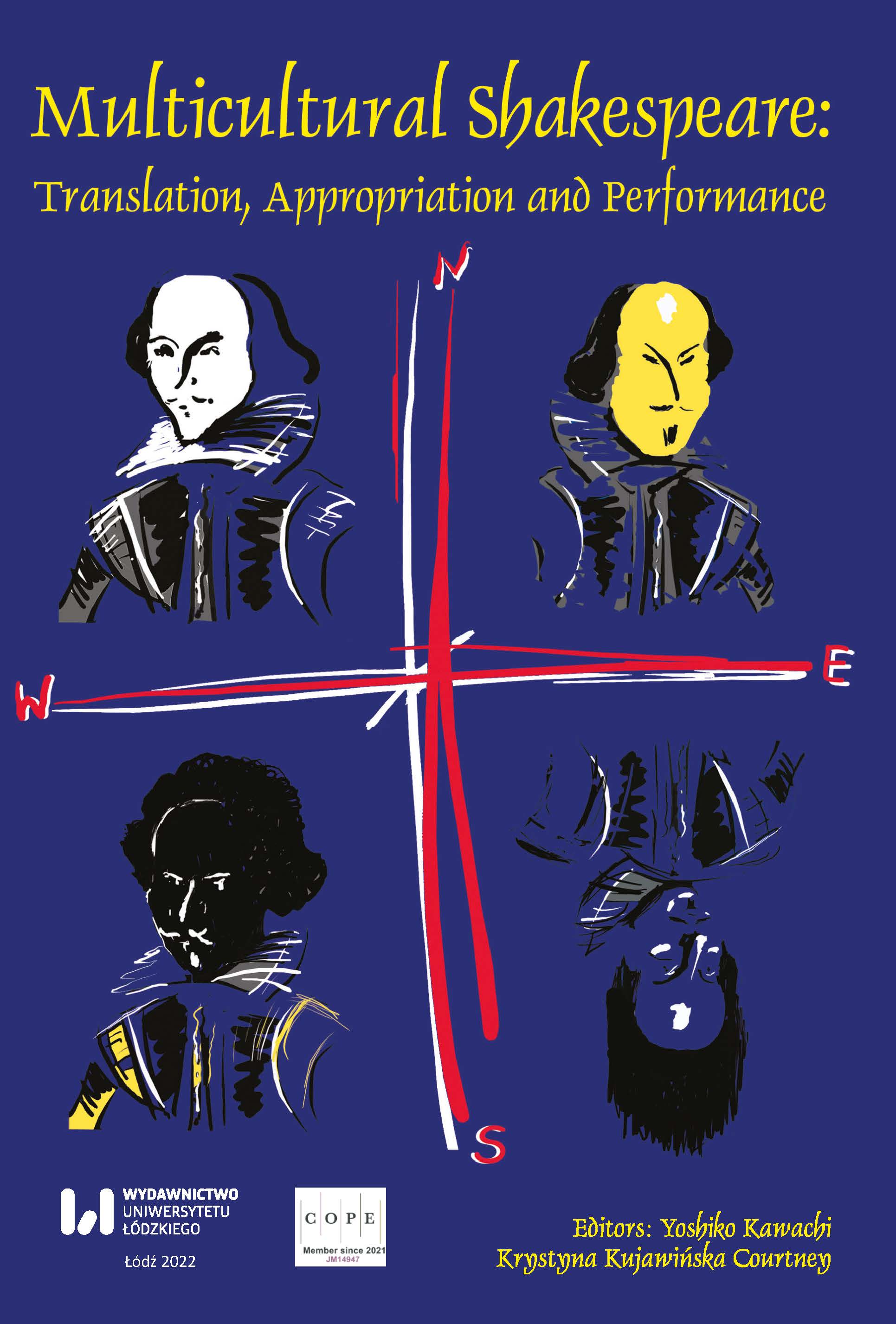“Hopeful feeling[s]:” Utopian Shakespeares and the 2021 Reopening of British Theatres
DOI:
https://doi.org/10.18778/2083-8530.26.04Słowa kluczowe:
Shakespeare and covid, Shakespare and crisis, Shakespeare in performanceAbstrakt
This article focuses on a specific moment in recent British theatre history: the late spring of 2021 when theatres reopened after a prolonged period of closure that had been enforced during the first waves of the Coronavirus pandemic. It considers The HandleBards’ production of Romeo and Juliet (performed at York’s Theatre Royal) and Shakespeare’s Globe Theatre’s production of A Midsummer Night’s Dream in the context of that unusual time. The productions, which both used bright colours and irreverent approaches to create festive atmospheres, had a shared joyful aesthetic which encouraged me to think more deeply about what audiences wanted—and needed—from post-lockdown theatre. In this article, I suggest that these vibrant Shakespeares, when presented in the immediate aftermath of the first waves of Covid, functioned as cathartic utopian performatives. They offered audiences uncomplicated joy and “a hopeful feeling of what the world might be like” after Coronavirus (Dolan 2005, p. 5). They “let audiences experience a processual, momentary feeling of affinity” and encouraged them to “imagine, together, the affective potential of a future in which this rich feeling of warmth, even of love, could be experienced regularly and effectively outside the theatre” (Dolan, p. 14). Utopian performatives are characterised by their transience and, inevitably, the simple joy of these Shakespeares was fleeting. Both venues have since hosted visually and thematically darker productions that have used Shakespeare to explore important social and political issues. Indeed, the HandleBards’ Romeo and Juliet and The Globe’s Midsummer are productions which might, in other circumstances, have been dismissed as simplistic. However, I suggest that these productions offered real hope for the future in the wake of crisis and demonstrate the importance of theatre in challenging times.
Pobrania
Bibliografia
Aebischer, Pascale. Viral Shakespeare: Performance in the Time of Pandemic. Cambridge: Cambridge University Press, 2021.
Google Scholar
Allred, Gemma Kate, Benjamin Broadribb and Erin Sullivan, eds. Lockdown Shakespeare: New Evolutions in Performance and Adaptation. London: Bloomsbury Arden Shakespeare, 2022.
Google Scholar
Auslander, Philip. Liveness: Performance in a Mediatized Culture. New York: Routledge, 1999.
Google Scholar
Berggren, Paula S. “Shakespeare’s Dual Lexicons of Plague: Infections in Speech and Space.” Representing the Plague in Early Modern England. Eds. Totaro and Ernest B. Gilman. London: Routledge, 2011: 150-186.
Google Scholar
Dolan, Jill. “Performance, Utopia and the ‘Utopian Performative’,” Theatre Journal 53.3 (2001): 455-479.
Google Scholar
Dolan, Jill. Utopia in Performance: Finding Hope at the Theater. Ann Arbor: University of Michigan Press, 2005.
Google Scholar
Dyer, Richard. “In Defense of Disco.” Out in Culture: Gay, Lesbian, and Queer Essays on Popular Culture. Eds. Corey K. Creekmur and Alexander Doty. Durham: Duke University Press, 1995.
Google Scholar
Greenblatt, Stephen, Walter Cohen, Suzanne Gossett, Jean E. Howard, Katharine Eisaman Maus and Gordon McMullan, eds. The Norton Shakespeare (Third edition). London: W. W. Norton, 2016.
Google Scholar
Jeffery, Lynsey. “Shakespeare’s Globe May Not Survive Pandemic, U.K. Lawmakers Warn.” NPR. 19 May 2020. https://www.npr.org/sections/coronavirus-live-updates/2020/05/19/858754044/shakespeares-globe-may-not-survive-pandemic-u-k-lawmakers-warn/ Accessed 5 February 2023.
Google Scholar
Kirwan, Peter. –“Romeo and Juliet (The Handlebards) @ Derby Theatre.” The Bardathon. 25 September 2021. https://blogs.nottingham.ac.uk/bardathon/2021/09/25/romeo-and-juliet-the-handlebards-derby-theatre/ Accessed 23 July 2022.
Google Scholar
Kirwan, Peter, and Erin Sullivan, eds. “Special Reviews Section: Shakespeare in Lockdown,” Shakespeare Bulletin 38.3 (2020): 489-547.
Google Scholar
“A Midsummer Night’s Dream Live Stream 2021.” Shakespeare’s Globe. 1 April 2021. https://www.shakespearesglobe.com/whats-on/a-midsummer-nights-dream-live-stream-2021/ Accessed 20 July 2022.
Google Scholar
“Playing Shakespeare with Deutsche Bank.” Shakespeare’s Globe. 20 April 2020. https://www.shakespearesglobe.com/learn/secondary-schools/playing-shakespeare-with-deutsche-bank/ Accessed 20 July 2022.
Google Scholar
Rokison, Abigail. Shakespeare for Young People: Productions, Versions and Adaptations. London: Bloomsbury Arden Shakespeare, 2013.
Google Scholar
“Romeo and Juliet, York Theatre Royal.” The Handlebards. Unknown publication date. https://www.handlebards.com/show/romeo-juliet-york-theatre-royal/ Accessed 20 July 2022.
Google Scholar
Saville, Alice. “Review: A Midsummer Night’s Dream at Shakespeare’s Globe.” Exeunt. 28 May 2021. http://exeuntmagazine.com/reviews/review-midsummer-nights-dream-shakespeares-globe-2 Accessed 25 July 2022.
Google Scholar
Smith, Peter J., Janice Valls-Russell and Daniel Yabut, eds. –“Shakespeare under global lockdown: reviews,” Cahiers Élisabéthains 103.1 (2020): 112-206.
Google Scholar
Stephenson, Joseph F. “A Midsummer Night’s Dream” (review). Shakespeare Bulletin 39.4 (2021): 708-712. https://doi.org/10.1353/shb.2021.0069
Google Scholar
“Throws Like a Girl 2000.” Rude Mechs. Unknown publication date. https://rudemechs.com/shows/tlag2000.html/ Accessed 20 July 2022.
Google Scholar
Totaro, Rebecca. Introduction. Representing the Plague in Early Modern England. Ed. Totaro and Ernest B. Gilman. London: Routledge, 2011. 1-33.
Google Scholar
Turner, Victor. From Ritual to Theatre: The Human Seriousness of Play. New York: Performing Arts Journal Publications, 1982.
Google Scholar
Wiegand, Chris. “A Midsummer Night’s Dream review – the Globe’s giddy return.” The Guardian. 27 May 2021. https://www.theguardian.com/stage/2021/may/27/a-midsummer-nights-dream-review-shakespeare-globe-london/ Accessed 25 July 2022.
Google Scholar
Wyver, Kate. “Wildest dreams: two midsummer nights with Shakespeare’s fairies.” The Guardian. 8 July 2019. https://www.theguardian.com/stage/2019/jul/08/a-midsummer-nights-dream-review-shakespeares-globe-london-regents-park-open-air-theatre/ Accessed 25 July 2022.
Google Scholar
Yandell, John, Jane Coles, and Theo Bryer. “Shakespeare for All? Some Reflections on the Globe Theatre’s Playing Shakespeare with Deutsche Bank Project.” Changing English: Studies in Culture and Education 27.2 (2020): 208-228. https://doi.org/10.1080/1358684X.2019.1620594
Google Scholar
Pobrania
Opublikowane
Wersje
- 2023-12-20 - (2)
- 2022-12-30 - (1)
Jak cytować
Numer
Dział
Licencja

Utwór dostępny jest na licencji Creative Commons Uznanie autorstwa – Użycie niekomercyjne – Bez utworów zależnych 4.0 Międzynarodowe.












